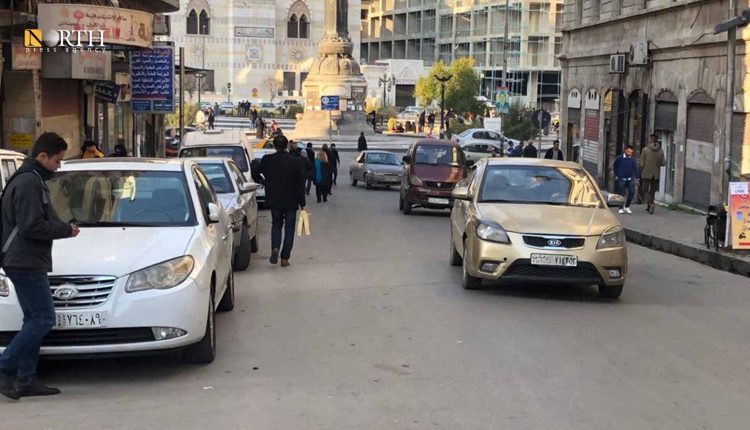Syrian Authorities Crack Down on Illegal Online Gambling Network After North Press Exposé
By Kardo Roj
Damascus, Syria (North Press) — On Monday, Syrian authorities announced the arrest of a 13-member network involved in organizing and promoting illegal online gambling, specifically through the popular but illicit betting platform “Ichancy.”
This move follows a detailed report by North Press Agency, published two days prior, which highlighted the rapid spread of online gambling in Syria and its harmful impacts, especially on vulnerable youth.
The Syrian Ministry of Interior released a video statement on its official Facebook page, confirming that the network operated from private residences in the Damascus suburbs of Jaramana and Sahnaya. The ministry reported that undercover surveillance led to the arrest of the network’s managers, along with a group of active participants. During the operation, authorities confiscated five laptops, significant amounts of cash in Syrian pounds and foreign currency, and two vehicles (a Kia Forte and a minibus) believed to be used for transporting participants and handling winnings.
The “Ichancy” Phenomenon: A Path to Destruction
Ichancy, an unlicensed betting app primarily focused on sports—especially football—has gained significant traction across Syria in recent years. It operates illegally without any government oversight, with users subscribing through intermediaries who facilitate their entry into the platform. This lack of regulation allows Ichancy to function in the shadows, where users often fall victim to manipulation and addiction.
In interviews with North Press, activists revealed that the app’s backers employ aggressive debt collection practices, allegedly linked to powerful figures in the Syrian government. Reports indicate that debt enforcers may visit the homes of debtors who cannot repay their bets, using intimidation tactics to recover funds.
“A Silent Epidemic”
For many young Syrians, the worsening economic crisis—marked by high unemployment and skyrocketing living costs—has driven them to explore desperate means of earning money. Online gambling has emerged as a dangerous yet alluring alternative, drawing countless individuals into financial ruin. The appeal of quick and substantial winnings soon fades, as many users spiral into debt, leading to dire consequences.
North Press spoke to a former distributor, “Ibrahim al-Ali” (a pseudonym), who outlined the recruitment process: “I provide new players with a link via a bot, where they register using their phone number and receive an activation code. Once verified, they can transfer funds to recharge their accounts, with minimum deposits as low as a single Syrian pound.” The platform’s games range from European football betting to a more straightforward “Tree of Luck” game, both offering an illusion of wealth while steadily draining users’ finances.
Ibrahim also noted that many players are required to sign blank promissory notes or offer valuables—such as jewelry, vehicles, or property—as collateral. This high-stakes system of borrowing and repayment has led to significant losses and escalating social issues.
Lifelong Consequences
One 28-year-old gambler, Hussein, shared his ordeal with North Press. Initially enticed by friends’ promises of easy money, Hussein quickly became addicted. “I burned through my entire salary within days and began borrowing money from friends and family. It was a downward spiral,” he said. When his debt reached critical levels, collectors began harassing his family, eventually compelling his father to sell family assets to settle the debt.
Other interviewees highlighted Ichancy’s toll on Syria’s social fabric. Fadi, a 52-year-old restaurant owner, recounted the tragedy of a young man from Jableh who took his own life after amassing debts of 40 million Syrian pounds (roughly $2,600). The young man had tried and failed to recover financially, ultimately succumbing to the pressure of debt.
Fadi commented, “This type of online gambling exploits the desperation of people trying to escape poverty, leading them to sell their homes, cars, and even commit crimes.” He added that Syria’s ongoing social and economic crises have exacerbated these issues, with little in the way of family support or social structures to help those in need.
A Growing Crisis
As Ichancy continues to spread, more individuals are suffering. Ubay, a barber from Damascus, spoke of employees who lost their jobs due to compulsive gambling on the app. He added that one of his friends even divorced his wife after accumulating unpayable debts.
Meanwhile, Muhammed, a young man from Jableh, described the platform’s stranglehold on Syria’s youth: “They ignore family warnings, steal to pay off debts, or sell their belongings to gamble. Many believe it will bring them wealth, but it only leaves them poorer.”
The North Press investigation has amplified public awareness of the severe social and economic damages caused by Ichancy and similar platforms. This recent crackdown by the Syrian Ministry of Interior suggests that authorities may be stepping up efforts to address these issues, though the long-term effects on Syria’s young population remain uncertain.

